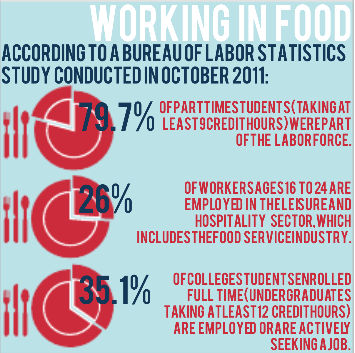Staff Reporter
Though most college students spend the first few weeks back at school collecting textbooks, supplies and class syllabi, many students add timecards and tips to that list. The few barriers for entry, flexible hours and decent pay of the food service industry draw in hundreds of UA students looking to earn money every year.
Senior Rishon Hanners, a journalism major and chef at Hotel Capstone, puts more than ingredients into her dishes. For her, cooking is a lifestyle, and one she wants to hold on to for the rest of her life.
“Cooking is an art,” she said. “You can do things with food that you can’t do with paint on a canvas.”
Hanners has been employed in the food service industry since she was 13 years old, when she began working in her parents’ restaurant. She plans to attend culinary school and open her own restaurant after earning her degree from The University.
This year, Hanners works approximately 24 hours a week at Hotel Capstone where, on weekends of home games, she feeds the Crimson Tide’s football players. She also puts in 15 to 20 hours per week working at the SUPeStore. She said balancing school and work takes a special brand of diligence.
“[Achieving a balance] is definitely difficult time management-wise, but it can be done. You have to stay highly organized,” she said. “When I’m not at work, I’m at school, and when I’m not at either, I’m doing homework for school. Staying up late also helps out a lot.”
According to the Bureau of Labor Statistics, the August 2010 mean for service industry workers in Tuscaloosa was $10.06 per hour. Hanners insisted these wages are adequate for students looking to finance their college education.
“It is possible to work in the food industry and pay for school,” she said. “You have to be passionate and work your tail off.”
Others, though, find the life of a working fulltime student too much to handle.
Angila Wilkins, a freshman majoring in studio art and English, worked at IHOP during her senior year of high school but said she decided not to hunt for a job during her academic years at UA because of the challenge of balancing school and work.
“I found it extremely tough and stressful to work during the school year and it was hard to keep up a social life because I worked on weekends,” she said. “It was much easier to work during the summer, which will be the only time I work until I graduate, and I prefer it that way.”
Hanners was almost to that point once, but said her dedication to the cooking was too strong to leave behind.
Cooking is a passion for Hanners, one she said brings her pure enjoyment and brings people together, but it’s never easy.
“People always say everyone should work as a police officer to respect what they do,” Hanners said. “I think everyone should work in food service and really have an appreciation for what goes into them sitting down and getting their meal.”








